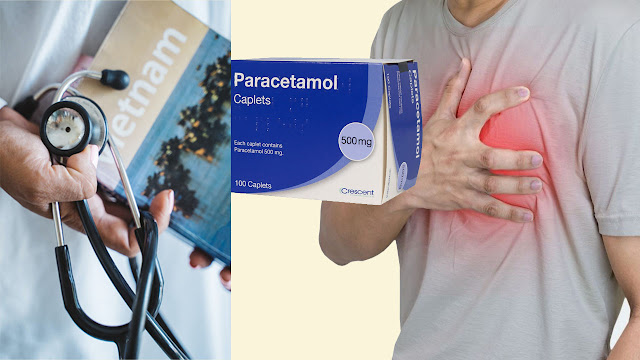Daily use of paracetamol has been found to elevate blood pressure and increase the risk of heart attacks, according to research. Doctors should avoid giving paracetamol to anyone who are at risk of a heart attack, according to the researchers.
According to a study, those with high blood pressure who take paracetamol on a regular basis may be at an elevated risk of heart disease and stroke.
As a result, experts recommend that patients with long-term prescriptions for the opioid, which is typically used to treat chronic pain, be given the lowest effective dose for the shortest time possible.
According to the study, blood pressure in the group given paracetamol rose considerably within four days, increasing the chance of a heart attack or stroke by 20%.
"We were attempting to encourage people to quit taking blood pressure-raising drugs like ibuprofen; we have always considered that paracetamol was the safest alternative," said Professor David Webb, chair of therapeutics and clinical pharmacology at the University of Edinburgh. It isn't, however."
"We recommend that professionals start with a modest dose of paracetamol and gradually raise the dose, never exceeding the level required to control pain." Given the significant increases in blood pressure found in some of our patients, doctors may find it beneficial to monitor blood pressure in people with high blood pressure who are starting paracetamol for chronic pain," he said.
People who need paracetamol for chronic pain should take a different blood pressure medication, according to the study.
"Two weeks of paracetamol medication increases high blood pressure, which is crucial because high blood pressure is a risk factor for heart attacks and strokes," says the researcher. Professor James Dear, personal chair of clinical pharmacology at the University of Edinburgh, echoed these sentiments.
According to the researchers, paracetamol was previously thought to be a perfectly safe medicine to use in people with the illness.
However, their findings suggest that the effect on blood pressure is comparable to that of nonsteroidal anti-inflammatory drugs (NSAIDs), such as ibuprofen, which are known to raise blood pressure and increase the risk of heart disease and are also used to treat chronic pain.
According to doctors, an increase in blood pressure could increase the risk of heart disease or stroke by roughly 20%.
They believe that the findings should prompt a re-evaluation of long-term paracetamol prescriptions for patients, particularly those who have the condition or are at high risk of heart disease or stroke.
"This study clearly reveals that paracetamol - the world's most used medicine – elevates blood pressure, one of the most critical risk factors for heart attacks and strokes," said Professor James Dear, personal chairman of clinical pharmacology at the University of Edinburgh.
"Doctors and patients should weigh the risks and advantages of long-term paracetamol prescriptions together, especially in patients who are at risk of cardiovascular disease."
"In summary, we've proven that two weeks of paracetamol medication increases blood pressure in people with hypertension (high blood pressure)," he said.
"This is not about short-term use of paracetamol for headaches or fever, which is, of course, fine – but it does indicate a newly discovered risk for people who take it regularly over the longer term, usually for chronic pain," said lead investigator Dr Iain MacIntyre, consultant in clinical pharmacology and nephrology at NHS Lothian.
The study discovered that when patients stopped taking the medicine, their blood pressure reverted to where it was at the beginning, implying that the treatment raised it.
"High blood pressure is the single highest risk factor for stroke," said Dr. Richard Francis, the Stroke Association's head of research.
"According to this new and thorough study, regular paracetamol causes blood pressure to rapidly rise in persons who are already at risk of stroke and heart attacks."
"It's critical that doctors examine and weigh the risks and benefits of administering paracetamol on a regular basis."


